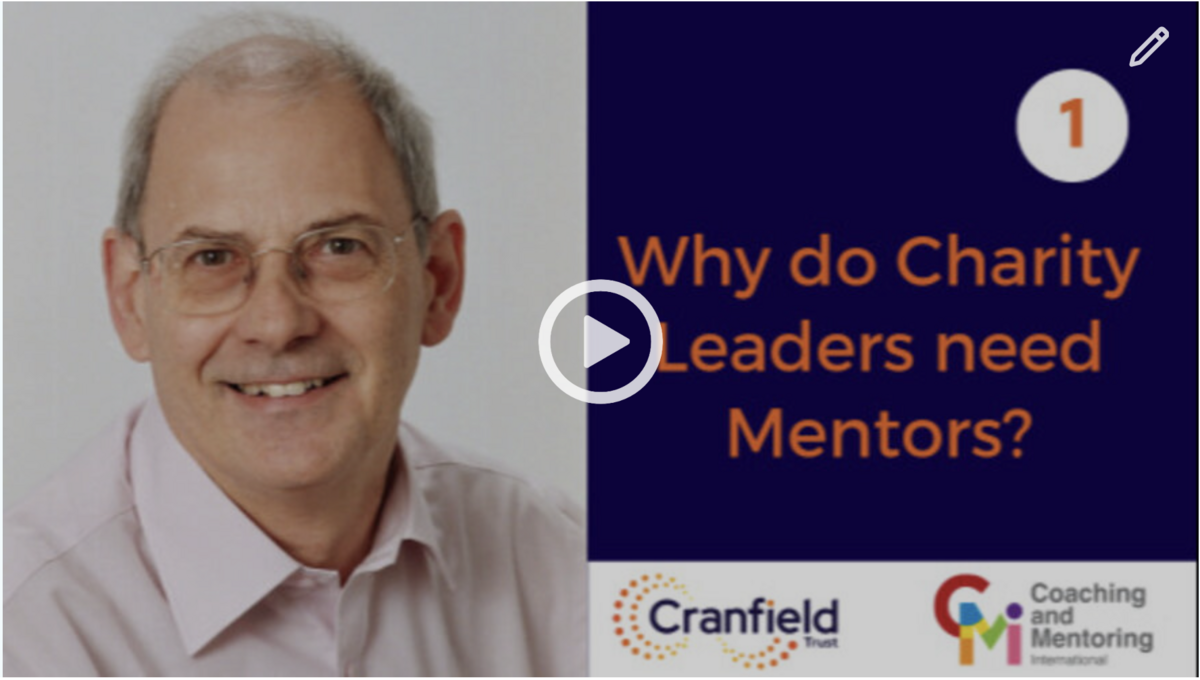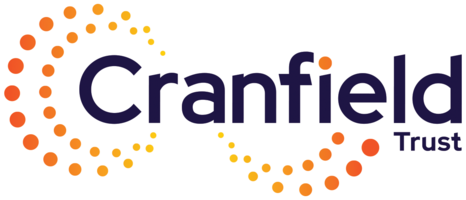Cranfield Trust introduction to mentoring
Our mentoring programme for charity leaders has seen a rise in demand over the last few years and continues to be our fastest growing area of management support. Mentoring provides an opportunity for leaders to shine and also provides a great self-development opportunity for the volunteers delivering the mentoring.
Our mentoring was developed with Professor David Clutterbuck, a leading and well-known expert in the field of mentoring and management development. Professor Clutterbuck's model of mentoring is based on developmental relationships transitioning through five phases:
- Rapport building
- Direction setting
- Progress making
- Winding down
- Moving on
Through a structured programme lasting six to eight months, the mentor volunteer builds a productive and transformational relationship with a charity leader, providing an opportunity to share successes, mistakes and learning.
The role of volunteer mentors
Mentoring is a helping relationship based on an exchange of knowledge, experience and good will. Mentors help someone less experienced gain confidence, clearer purpose, insight and wisdom. In development mentoring the mentor too is changed by the mentoring relationship.
"The mentoring programme benefits mentors at least as much as mentees as the skills developed in helping people make good decisions can be applied in the mentor's organisation." Matthew Johnson, volunteer
As a mentor volunteer, you will:
•Meet with your mentee once a month over a six-to-eight-month programme
•Have an ability to listen and reflect and be able to ‘read’ a situation
•Be able to challenge constructively without being prescriptive
•Have empathy and an ability to see things from different perspective
Cranfield Trust does not provide counselling advice. Counselling differs from mentoring as it focuses on understanding and healing emotional disturbances in relation to the past and present. Often it involves exploring childhood problems and exploring the impact that they have on how a client responds to things in the present day.
If a charity client needs support with mental health, please suggest they visit: www.mind.org.uk/information-support/

Useful resources for volunteer mentors
In collaboration with David Clutterbuck, a leading researcher on Mentoring, we have developed some hints and tips for our volunteer mentors to support mentoring charities.
David co-founded the European Mentoring & Coaching Council, the primary professional organisation in the field with Europe, and is now its Special Ambassador, promoting good practice in coaching and mentoring internationally. He founded the International Standards for Mentoring & Coaching Programmes. He was voted Coaching at Work magazine’s first Mentor of the Year and is visiting professor at three universities – Sheffield Hallam, Oxford Brookes and York St John.
The assumption is that our volunteers have prior mentoring/ coaching experience and the bite-sized learning that we offer is a refresher/ revision of what mentoring is and how we approach it.
The learning is divided into 12 sessions delivered by David Clutterbuck and takes about three hours in total to complete.
Each video is dedicated to a specific topic and comes with a short quiz that you will be asked to complete in order to check what you have remembered from the video. You will need to register for each webinar you watch.
You will also be given a slide deck that goes above and beyond the videos.
Content
1 – Why do Charity Leaders need mentors?
2 – What do Mentors do?
3 – What Makes a Great Mentor
4 – Responsibilities, Partnership, Development, Values and Purpose
5 – Success
6 – Tools and Techniques for approaching Mentoring
7 – Mentor as a Role Model
8 – Seven Conversations in One
9 – Tools and Techniques for Conversations
10 – Diversity
11 – Understanding the Whole Person
12 – Mentor Development Plan
Benefits of learning
- developing new mentoring skills
- adding new tools and techniques to your mentoring sessions
- becoming a more experienced and successful mentor
We also have exclusive access to David Clutterbuck’s library of coaching and mentoring resources. Please contact the Mentoring Coordinator for access details.
Accessing mentoring resources
Please contact our Mentoring Coordinator Emilia Ufir-Kaparaboina to be given access to our resources. We are not able to share openly on this platform because it is exclusive to Cranfield Trust, so we will only share with mentor volunteers directly.
Reflective sessions for mentors
Each month we hold reflective sessions for volunteer mentors. The sessions are peer-led and open to volunteers who are currently on a Cranfield Trust mentoring assignment. If you are not currently mentoring through Cranfield Trust but would like to attend the session, please contact the Mentoring Coordinator.
The aim of the reflective sessions is to enable our mentors to meet and exchange ideas/ discuss topics related to mentoring and learn from each other. We kindly ask all attendees to come to the session willing to contribute to our group discussions.
Mentoring videos
We have created a playlist of useful videos on our YouTube channel. These videos will complement our training, provide further insights for existing and potential mentors and explain how we distinguish between mentoring and coaching. The videos may also answer some of the questions you might have and give you more clarity on our mentoring offer.
Code of Conduct
We adhere to the Code of Conduct for Mentors and Mentees developed by Professor David Clutterbuck:
The purpose of a Code of Conduct is to provide a guideline on what is acceptable and non-acceptable behaviour within a mentoring relationship. The suggested Code below applies both during and after the relationship –the obligations of both parties continue once the relationship has achieved its purpose.
1. The mentoring relationship is one, which depends on mutual trust. Neither party may discuss the content of their conversations with other persons –including the mentee’s line manager –without express permission of the other party. The sole exception is in the specific context of professional mentor / mentee supervision, with a professional supervisor or with the programme manager.
2. Mentor and mentee will be as open as possible with each other at all times. This includes telling each other when they are uncomfortable about some aspect of the relationship.
3. It is understood that, at times, mentor or mentee may not be able to divulge certain information that they hold in confidence. Equally, if they do divulge information to each other in confidence, both parties must respect that confidence.
4. The responsibility to review the relationship is shared between mentor and mentee.
5. Mentor and mentee both have a duty of care to each other. They also have a duty of care to the organization. They should not do anything, which damages the reputation of the company or brings harm to other people.
6. Mentor and mentee both have an obligation to use the relationship wisely. This includes preparing for mentoring meetings and respecting each other’s time.
7. Should any conflicts of interest or other ethical issues arise, mentor and mentee should first acknowledge and discuss these, then, if appropriate, seek guidance from the programme manager or mentor supervisor.
8. Unless specified within the programme purpose, mentors should not take on the role of sponsor for the mentee, and mentees should not expect them to do so.
9. Mentoring is a “professional friendship”. It is inappropriate for the relationship to become physically intimate. Mentor and mentee have a mutual responsibility to avoid such situations during the course of the formal relationship, or to withdraw from the mentoring relationship should it be in danger of becoming physically intimate.
10. Mentees acquire a personal obligation to pass on the gift of mentoring.
© David Clutterbuck, 2014




